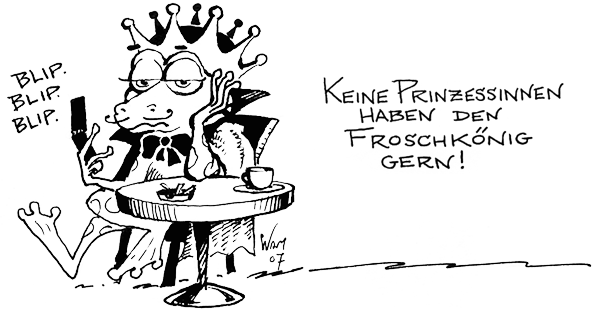![]() Verbs:Gefallen
Verbs:Gefallen
The verb gefallen is not only irregular in the present tense, but also has a strange meaning for English speakers. Like many other irregular verbs, it changes the stem vowel in the second and third person singular forms (du and er/sie/es). It literally means something is pleasing to someone, but in a more meaningful translation you would say in English that it means 'like' but the structure of the phrase is different between English and German. This verb requires a dative noun or pronoun as one of its complements.
| gefallen • to like (watch out for appropriate meaning!) | |
| ich gefalle ihm (He likes me) | wir gefallen ihr (she likes us) |
| du gefällst mir (I like you) | ihr gefallt mir (I like y'all) |
| er/sie/es gefällt mir (I like him/her/it) | sie gefallen mir (I like them) |
In der Therapie: As part of the healing process, after so much evil and after such vicious pasts, the Schlosseinwohner participate in weekly therapy sessions (led by Aschenputtel, the recently graduated psychotherapist) to ensure a friendly - or at least civil - coexistence in their new residence. Here are some recordings of their sessions:
| der Prinz | Schneewittchen gefällt mir so sehr! | I like Snow White so much! |
| die böse Königin | Und gefalle ich dir auch? | And do you like me too? |
| der Prinz | Also, nein, leider nicht! Sie gefallen mir gar nicht. Es tut mir wirklich leid. | Well, no, unfortunately not. I don't like you at all. I'm really sorry. |
| die böse Königin | Schon gut. Du gefällst mir auch nicht. Mir gefallen mehr ältere Männer, die reich sind! | Oh well, I don't like you either. I prefer older men, who are rich! |
gefallen is used with nouns. You can start with the dative noun (here, the person doing the liking) or with the nominative noun (the one who is liked).
| Dem Froschkönig gefällt die junge Prinzessin. | The frog king likes the young princess. |
| Der Froschkönig gefällt der jungen Prinzessin überhaupt nicht! | The young princess does not like the frog king at all! |
![]() Likes and dislikes
Likes and dislikes
You can also express like or dislike with gern haben or gern + verb.
gern haben is used with nouns, just like gefallen, but it does not require the dative case. The haben part gets conjugated according depending on who does the liking:
| Der Froschkönig hat die junge Prinzessin gern. | The frog king likes the young princess. |
| Leider hat die junge Prinzessin den Froschkönig überhaupt nicht gern! | Alas, the young princess does not like the frog king at all! |
| Keine Prinzessinnen haben den Froschkönig gern! | No princesses like the frog king! |
gern can be used with verbs to describe activities one enjoys doing. The verb is conjugated to match the person who is doing the enjoying:
| die Hexe | Ich esse gern kleine Kinder! | I like to eat small children! |
| Aschenputtel | Und was machen Sie sonst noch gern? | And what else do you like to do? |
| die Hexe | Hmm ... ich lese und schreibe gern Gedichte! | Hmmm ... I like to read and write poetry! |
| die böse Königin | Haha, aber sie bäckt nicht mehr gern! | Teehee, but she no longer likes to bake! |
| die Hexe | Warum musst du diese Geschichte immer wieder aufrühren? Du weißt doch, dass ich da gar nicht gern drüber spreche! | Why do you have to keep bringing up this story? You know quite well that I don't like to speak about it at all! |
| der Gefallen | favor |
| tue mir einen Gefallen | do me a favor ... |
| das Gefallen | pleasure |
| gefällig | helpful, pleasant (e.g., behavior) |
| lass dir das doch nicht gefallen! | don't let them do that to you! |
| erlaubt ist, was gefällt | anything goes |


